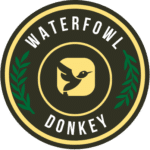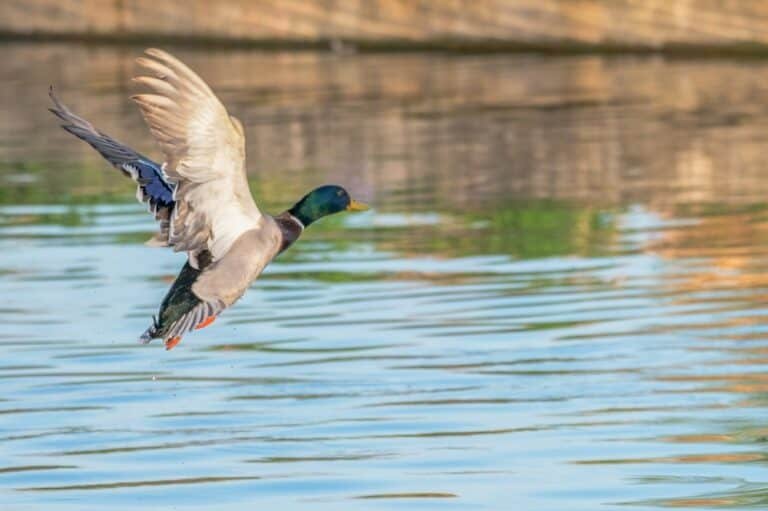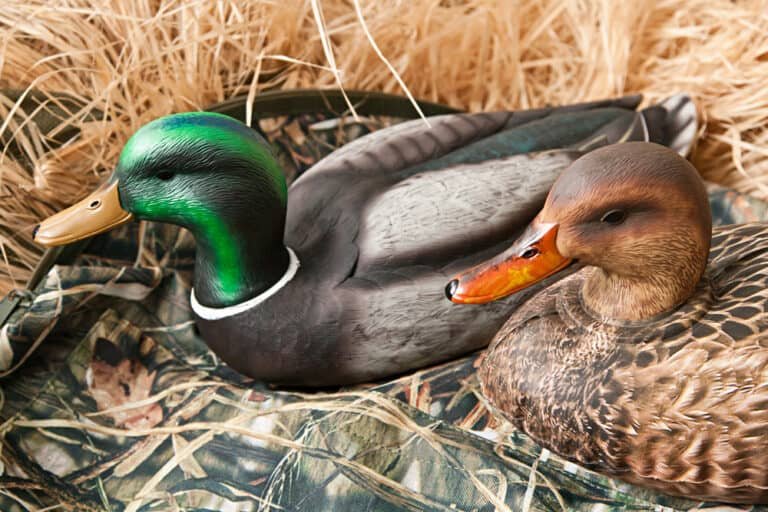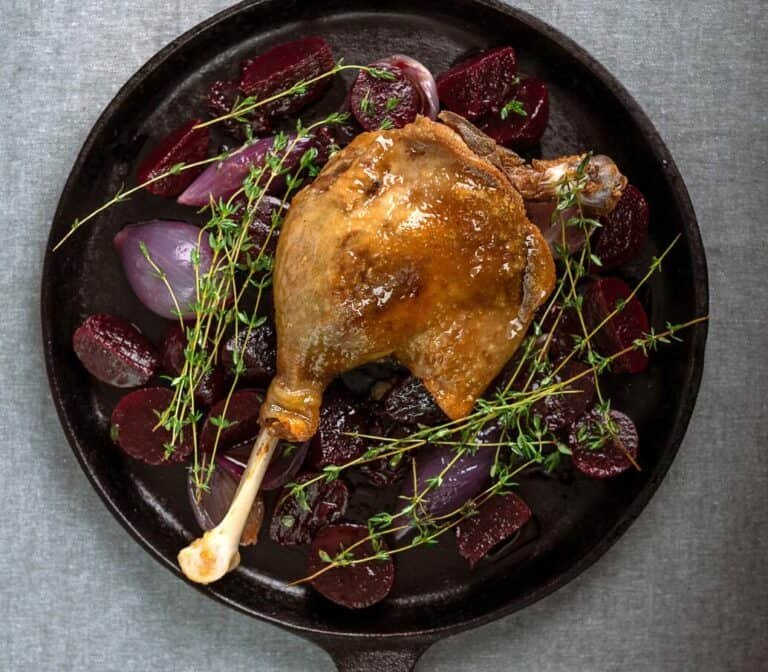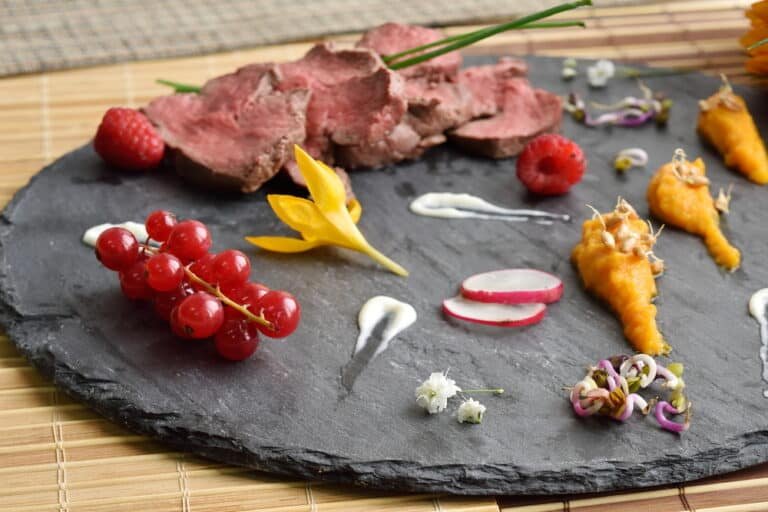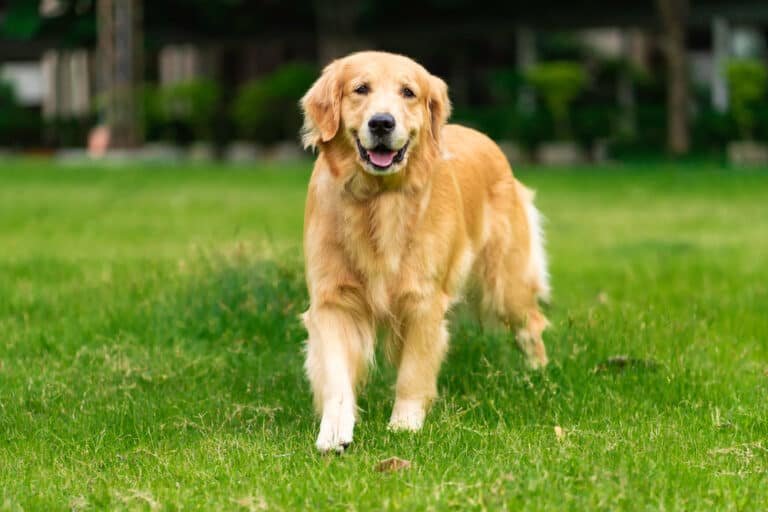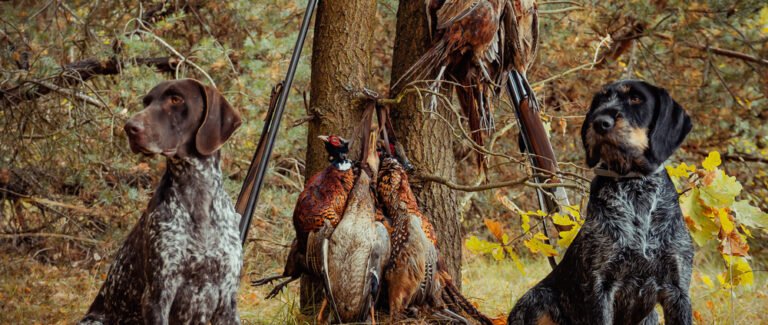Hunting Dog Care – How to Protect Your Hunting Companion
As avid hunters, we know the exhilaration that courses through our veins when embarking on a hunting expedition. The palpable anticipation, the smell of the wilderness, and the thrill of the chase all contribute to an experience like no other.
But amidst our excitement, it is crucial not to overlook one vital aspect: caring for our loyal hunting companions. I’m talking about our trusty hunting dogs – those four-legged heroes who work tirelessly by our side.
This detailed guide will delve into the intricacies of caring for your hunting dog during hunts. From safety precautions to health considerations and creating a comfortable environment, we will leave no stone unturned in ensuring that our faithful friends receive the best possible care.
Setting the Stage for a Successful Hunt
Before stepping foot into Mother Nature’s arena, setting up a solid foundation for success is essential. A well-prepared hunter understands that meticulous planning and attention to detail are paramount. This includes familiarizing yourself with your hunting grounds – studying maps and trails meticulously to avoid getting lost or disoriented during your expedition.
In addition to maritime preparation, conducting thorough research on your quarry species – their habitats, feeding patterns, and behavior is vital. By becoming intimately familiar with these factors, you can strategically position yourself and your dog for maximum success.
The Importance of Caring for Your Hunting Dog
In today’s fast-paced world, where efficiency often reigns supreme, some may view their dogs as mere tools or accessories in pursuit of the game. However, any experienced hunter understands that treating a hunting dog as anything less than an esteemed partner is ethically wrong and detrimental to overall performance. A well-cared-for hunting dog is not just another piece in your hunting arsenal; they are an integral part of the hunting experience.
A neglected or mistreated dog will not only perform poorly but may also jeopardize the safety of the hunter and themselves. Our duty as responsible hunters is to ensure that our hunting dogs receive the physical, mental, and emotional care they deserve.
Safety First: Protecting Your Hunting Companion
Outfitting your dog with appropriate safety gear
Ah, the noble hunting dog, a loyal companion that fearlessly plunges into the wilderness beside you. But let me ask you this, my fellow hunters: have you ever considered outfitting your four-legged friend with proper safety gear?
It’s time we take responsibility for their well-being too! One essential piece of gear is a reflective vest.
Yes, you heard me right – a vest for your canine comrade. Picture this: it’s dusk, and visibility is waning.
The last thing you want is to lose sight of your faithful partner amidst the shadows. They’ll be like a beacon in the wild with a reflective vest, ensuring all see them.
Let’s not forget those precious paws; protective boots are a must! These rugged boots shield their delicate pads from jagged rocks, thorny bushes, or treacherous terrain that may lurk beneath their paws.
Ensuring a safe hunting environment
Now that we’ve covered outfitting our furry friends with safety gear fit for adventure enthusiasts like us let’s talk about ensuring a safe hunting environment. It’s not just about us having fun; it’s crucial to ensure our dogs are protected from potential hazards.
Familiarize yourself with local regulations and restrictions – I know it may seem tedious and bureaucratic sometimes – but trust me when I say it pays off keeping you and your dog out of trouble. Before unleashing Fido into the great unknown, scan the area for potential dangers, such as toxic plants or dangerous wildlife lurking in the foliage.
Remember this sage advice: an ounce of prevention is worth more than a pound of cure. So let’s keep our hunting grounds safe, not just for ourselves but for our loyal companions by our side.
Health Matters: Keeping Your Dog Fit and Healthy
Pre-hunt veterinary care and vaccinations
Before embarking on any hunting adventure with your loyal companion, it is imperative to prioritize their health and well-being. A responsible dog owner understands the significance of pre-hunt veterinary care.
Scheduling a thorough check-up before each hunting season ensures that your dog is physically fit for the challenges ahead and addresses any potential health issues promptly. It allows the veterinarian to assess your furry friend’s overall condition, including joint health, cardiovascular fitness, and any underlying medical conditions that may impair their performance in the field.
Ensuring up-to-date vaccinations
Exposure to various environmental elements and wildlife poses a significant risk of contracting diseases in hunting dogs. That’s why keeping your canine companion up-to-date with vaccinations is crucial.
Protecting them against common diseases such as parvovirus, distemper, rabies, and leptospirosis safeguards their health and prevents potential spread among other hunting dogs or even humans. Vaccinations act as armor against these infectious threats, bolstering your dog’s immunity so they can focus on what they do best – assisting you during exhilarating hunts.
Proper nutrition for optimal performance
Nutrition is pivotal in maintaining your hunting dog’s well-being and enhancing its performance during hunts. To optimize their capabilities in the field, tailoring their diet to meet specific needs is paramount. High-quality protein sources are indispensable for muscle development and repair – after all, strong muscles lead to powerful strides while chasing down the game.
Ensuring an adequate fat content in their diet is equally essential as it provides sustained energy during prolonged hunts without compromising endurance or stamina. Remember, a well-fed dog is a happy and resilient hunting companion, ready to tackle any challenge that comes their way.
Comfort Zone: An Environment Conducive to Success
Providing adequate shelter during breaks or overnight stays
When embarking on a hunting expedition with your trusty four-legged companion, it is crucial to prioritize their comfort during rest periods. After all, a well-rested dog is a rejuvenated hunting partner. To achieve this, consider investing in portable kennels or tents easily set up in the field.
These shelters offer protection from the elements, shielding your furry friend from rain, wind, and intense sun rays. Opt for models with durable materials and sturdy construction to withstand the rigors of outdoor excursions.
Insulated dog houses at home base
Once you return from a physically demanding day in the field, providing your hunting dog with a tranquil space to recuperate is essential. Insulated dog houses serve as cozy sanctuaries where your canine companion can unwind and recharge for future adventures.
These shelters are designed to regulate temperature fluctuations, keeping your pup warm during chilly nights and cool on scorching summer days. With their well-insulated walls and elevated floors that keep moisture away, these houses create an optimal atmosphere for quality rest.
Hydration and cooling strategies in hot weather conditions
As temperatures rise during those sweltering hunts under the scorching sun, it becomes imperative to prioritize hydration and implement effective cooling techniques for your beloved hunting partner. Ensure you carry sufficient water supplies and lightweight bowls for frequent daily hydration breaks.
Remember that dogs may require more water than usual during strenuous activities. To combat overheating, consider utilizing specialized gear such as cooling vests or bandanas to maintain body temperature within safe limits.
These innovative accessories use evaporative technology to relieve heat stress by promoting efficient heat dissipation. Additionally, misting systems can be a game-changer, keeping your dog cool and refreshed during those relentless summer hunts.
By employing these strategies, you are ensuring your dog’s comfort and safeguarding its well-being in the face of extreme temperatures. Maintaining your hunting dog’s comfort during hunts is crucial for its overall performance and well-being.
Providing adequate shelter during breaks or overnight stays ensures they have a haven to recuperate and recharge. Insulated dog houses offer a cozy retreat at home base, promoting restful sleep after long days in the field.
Furthermore, implementing hydration and cooling strategies helps prevent overheating and ensures your canine companion remains energized throughout the hunt. Remember, caring for your hunting dog’s comfort is not just a luxury but an essential component of responsible ownership that contributes to their success as an invaluable partner in the wild.
Fine-Tuning Techniques: Enhancing Performance
Tips to Make Your Hunting Dog a Master of the Hunt
When hunting, your dog’s performance can make or break the entire experience. To maximize your hunting companion’s abilities, consider implementing these fine-tuning techniques.
Firstly, focus on obedience training to ensure your dog responds promptly and accurately to commands in the field. This will not only enhance safety but also improve overall efficiency during hunts.
Secondly, engage in scent training exercises to sharpen your dog’s olfactory skills and increase its ability to locate games efficiently. Scent-based games or special training aids can help take their tracking abilities to the next level.
Practice retrieving exercises regularly, as a well-trained retriever is a valuable asset on any hunt. Encourage precision and consistency in retrieving the game by incorporating various scenarios into your training sessions.
The Power of Positive Reinforcement
It is crucial to remember that positive reinforcement is key when fine-tuning your hunting dog’s skills. Rewarding good behavior enhances their motivation and strengthens the bond between you and your canine companion.
Incorporate treats, praise, or even playtime as rewards for following commands correctly, exhibiting excellent tracking skills, or executing a flawless retrieve. By consistently employing positive reinforcement techniques, you’ll enhance their performance and create an enjoyable learning experience for you and your four-legged partner.
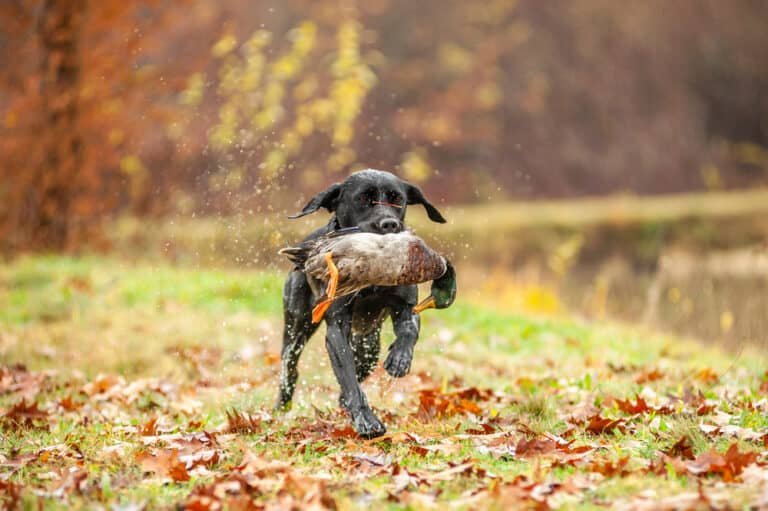
Conclusion
Caring for your hunting dog during hunts goes beyond basic safety measures; it encompasses health maintenance, ensuring comfort in outdoor environments, and fine-tuning techniques for optimal performance. You prioritize their safety by outfitting them with appropriate safety gear, such as reflective vests and protective boots while adhering to local regulations and checking for potential hazards.
Additionally, by focusing on pre-hunt veterinary care, vaccinations, and providing a nutritionally balanced diet, you guarantee that your hunting companion is in top physical shape. Creating a comfortable environment with adequate shelters and implementing hydration and cooling strategies further contribute to their well-being.
Fine-tuning their skills through obedience training, scent training, and retrieving exercises elevates their performance on the hunt. Always employ positive reinforcement techniques to create a harmonious bond between you and your loyal companion.
With these comprehensive tips in mind, enjoy the thrill of the hunt alongside your well-cared-for hunting dog, confident in their safety, health, comfort, and enhanced performance. Happy hunting!
